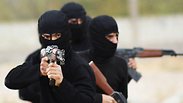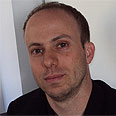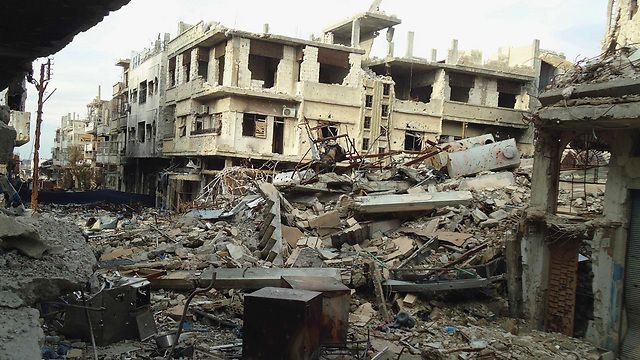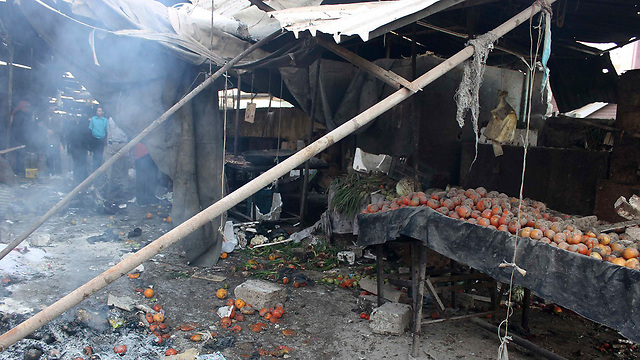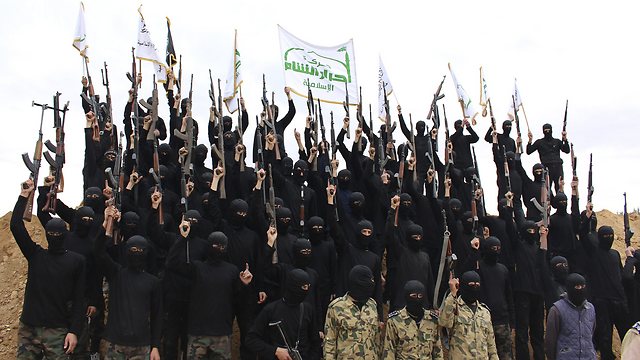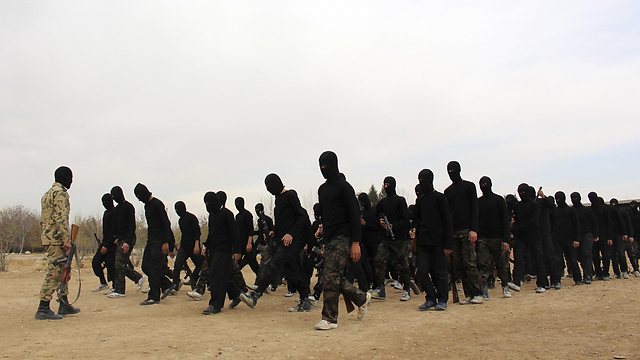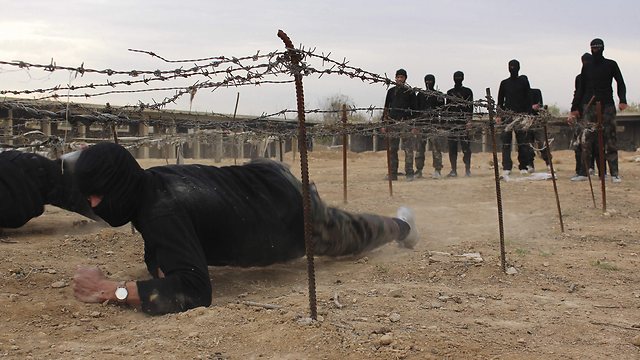Drugs and dreams of paradise: Hezbollah and al-Qaeda in Syria
Analysis: Drugs and radical religious indoctrination go together a little too well in Syria's true battle over the hearts and minds of young men enlisted to join ranks of radical al-Qaeda inspired groups. Dr. Yaron Friedman analyzes the rise to power of Hezbollah and new al-Qaeda-linked group, claiming they pose a bigger threat than the Syrian conflict itself
The sheikh's identity isn't known to anyone. He never received official religious training, and in a sense, he invented his own version of Islam. He recruits young stray children, using drugs to intoxicate them, promising them dreams of paradise in heaven, all on the condition that they listen to what he says. On his command they commit suicide in order to kill, in an effort to plant fear and terror in the streets of Syria.
The aforesaid description is not from our postmodern age, but rather from the 12th Century's cult of Shiite Nizari-Ismali, who used the drug hashish before killing their enemies. They became known as assassins, which is linguistically traced back to the word hashish.
Related stories:
- With Muslim Brotherhood crushed, Egypt sets sights on Hamas
- Expectations low for Syrian peace talks
- Top al-Qaeda commander dies in Lebanese jail
But despite the aged depiction, the account can just as well be adapted to the Syrian al-Qaeda leader Abu Bakr al-Baghdadi.
In recent months, there has been a worrying rise in the power of radical forces in Syria. The opposition forces that started the revolt against Syrian President Bashar Assad in 2011 is fading away, and the Islamic Front, a merger of another seven rebel groups, is also withdrawing from the action.
The Al-Nusra Front, who has been one of the most successful rebel groups, is also in danger of being wiped out – all due to the rise of Islamic State of Iraq and the Levant, known by its acronym ISIL, or Daish in Arabic.
In the past week ISIL have taken over Raqqah, a key city in the north and a rebel stronghold. Media reports said the 700 people were killed on both sides during the two-week battle. A hundred prisoners of war from Al-Nusra Front were executed and buried in a mass grave. Other rebels in the area were only spared from the cruel death that their comrades in action had after swearing allegiance to ISIL.
The defeat of moderate Islamists was felt in other areas in the country as well, such as Homs and al-Hasakah in the north. ISIL is trying to take over the entire northern region of the country, and they have had more than one confrontation with Turkish soldiers. At this rate, ISIL is expected to take over the region, and all other rebel opposition forces will be subdued.
The battle will be solely between ISIL and Assad's army.
ISIL, which is made up mostly of foreign volunteers, is strengthening the theory that is making its way around the Arab world – ISIL terrorists are another military arm of Assad's regime.
Who's running ISIL?
No one can explain the recent success of ISIL to fill in the vacuum and chaos that took over Syria. It's fairly simple to trace the support and funding of groups like the Free Syrian Army and the Islamic Front, which come from Persian Gulf countries and Saudi Arabia respectively. But the al-Qaeda branch in Syria's support is very hard to find.
The fact that its leaders are always masked only adds to the mystery. The claim that it's independently funded isn't viable considering the amounts of ammunition and supplies it has.
From a tactical perspective, ISIL serves the Syrian regime's interests in all its respects. The group is strengthening Assad's propaganda that the rebel groups aren't more than terrorists whilst weakening the non-military wings that are calling themselves an alternative to Assad's government.
ISIL is threatening to turn the rebel forces into an ineffective party in the Geneva peace talks this month, as well as block any attempt for Western intervention that the other rebel forces want so desperately.
Due to the fact that the funding of al-Qaeda challenges the interests of the Persian Gulf countries, as well as Saudi Arabia, the Arabic media has been spreading a conspiracy theory that ISIL is on the end of the Syria-Russia-Iran trail.
These countries, along with Shiite leaders in Iraq, are secretly funding the group, Arabic papers say. Those trying to uphold the conspiracy theory are saying that ISIL senior leaders are radical Islamists who were released from jail in Iraq and Syria by Iraq Prime Minister Nouri al-Maliki and Assad.
The moderate prisoners were killed and the radicals were released in order to form a military group that would destroy the rebels from within Syria.
Al-Arabiyya revealed the group's recruiting details, in addition to its drug-dealing connections.
Drugs and brainwashing
The Daish recruitment framework is built on volunteering young Jihadists from all over the world, primarily via Facebook. Saudi psychologist Dr. Jamal Tuirki told Al-Arabiya television that a significant number of these recruits were youths and young men who were looking for meaning in their lives and were easy to manipulate.
Once recruited, the young men were subjected to brainwashing and told to grow a beard. At the end of the process, they were taken to Syria or Iraq ready to become shahids (martyrs) and commit suicide if ordered, out of utter conviction that they would reach paradise. The "sheikhs" who prepare them are not men of faith at all, but skilled terrorists.
According to varying sources, the recruitment process the young men undergo involves copious amounts of drugs, primarily heroin, marijuana and the Syrian-made amphetamine Captagon. Daish smuggles the drugs across Syria's borders for use in training and to distribute to the fighters. In Jordan, for example, the authorities have caught dozens of Syrian drug smugglers in the past year. Daish also uses the drugs as a source of income, thereby giving weight to the conspiracy theory that the primary producer of Captagon is Hezbollah .
Hezbollah: Assad's terrorists
Syria's western front has also been overrun by terrorists, in this case the Shiite Hezbollah organization. Hezbollah's evolution into a major fighting force in Syria is largely connected to the mass defections from the Syrian army in the first year and a half of the civil war still raging in the country. Syria's army traditionally fell along social lines – the elite party faithful, the Alawites, went into the elite ranks, such as the air force and armored corps.
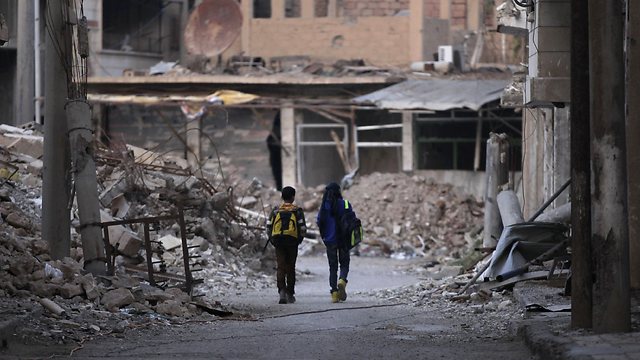
The less desirable classes, such as the Sunnis, went into the less desirable units, such as the infantry, and that was where the first defectors came from. When war erupted, the Syria regime found itself with an army without foot soldiers who could take control of areas on the ground.
It was into this vacuum that Hezbollah entered, with a strong number of infantry men, it was able to pick up the slack and take over the areas which the Syrian air force and artillery destroyed, just like what happened in Qusair.
Hezbollah, like its new rival Daish, is only a pawn at the hands of larger power, and is completely controlled by the Iranian Revolutionary Guard. The group also drugs its younger recruits, both with zealous religiosity and actual narcotics. Like Daish, Hezbollah also receives support from Iraqi militants.
Irrelevant but in control
There is no doubt that that situation on the ground in Syria is controlled by radical terrorist cells, and the fighting between the regime and rebels has been pushed to the sidelines. As fighting continues, Assad's dependence on Hezbollah rises.
Yet it is important to remember that no matter how strong they are in number, these terrorists are just tools in the hands of external powers. They are sides in the fighting but not in its resolution.
During the upcoming Geneva II conference, the two sides – rebels and Assad's embattled regime – will need to make some compromises. Assad will have to give up on Hezbollah's assistance and the rebels will have to rid themselves of Daish, a group some of them are already actively working to destroy.
In Geneva the powers will work find a solution for Syria which extracts radical terrorists from the scene before critical decisions regarding Syria's future are made. For Geneva to be a success, the US and Russia make sure that all sides agree that stopping terror will be the main axis of negotiations.
The questions regarding Assad's future position in power or general elections in Syria will have to be postponed by Kerry and Lavrov to the next Geneva talks.
Dr. Yaron Friedman, Ynet's commentator on the Arab world, is a graduate of the Sorbonne. He teaches Arabic and lectures about Islam at the Technion, at Beit Hagefen and at the Galilee Academic College. His book, "The Nusayri Alawis: An Introduction to the Religion, History and Identity of the Leading Minority in Syria," was published in 2010 by Brill-Leiden













